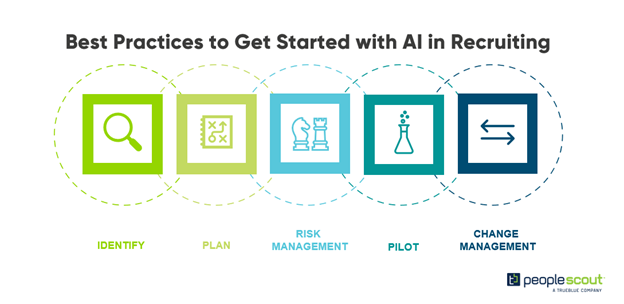With today’s skills shortages, recruiters are facing a more and more daunting challenge of identifying and engaging qualified candidates efficiently. Artificial intelligence (AI) has emerged as a game-changing technology in the recruitment process, particularly in talent sourcing. AI candidate sourcing represents a significant advancement, helping organizations go from manual database searches, job board postings and referral networks to fast, automated processes.
According to a survey by Workable, 63% of organizations now use some form of AI in recruiting. But only 8% use AI for candidate sourcing. By thoughtfully integrating AI into sourcing strategies, talent acquisition teams can spend less time searching for candidates and more time building meaningful connections.
This article explores how AI sourcing tools are transforming recruitment strategies and offers practical insights for organizations looking to enhance their talent acquisition efforts.
The Evolution of AI Candidate Sourcing
The digital transformation of recruitment began with the advent of applicant tracking systems and online job boards, but AI has taken sourcing capabilities to unprecedented levels. AI excels at scale. By analyzing a massive data set of millions of pieces of information including online candidate profiles, AI can identify candidates within minutes. For example, Affinix®, PeopleScout’s proprietary total talent suite of AI-powered tools, accesses over 1.3 billion public profiles of passive candidates across 23 of the top global job sites within seconds of a requisition opening.
Key Capabilities of AI Candidate Sourcing
AI sourcing has revolutionized talent discovery, empowering organizations to identify, assess and engage talent with remarkable precision and efficiency. Here a few of the benefits of AI sourcing tools.
1. Advanced Candidate Matching
AI algorithms excel at pattern recognition and can analyze vast datasets to identify candidates whose skills, experience and potential align with job requirements, including passive candidates who may not be actively job searching but have the right qualifications. These individuals rarely respond to traditional job postings, making them invisible to conventional recruitment methods. AI candidate sourcing excels at identifying hidden gems based on their digital footprints and professional activities, enabling recruiters to engage with talent that would otherwise remain undiscovered.
Unlike traditional keyword matching, modern AI sourcing tools leverage skills matching with sophisticated natural language processing and machine learning algorithms to comprehensively analyze candidate profiles. By understanding semantic relationships between skills, experiences, and job requirements, leading technologies can create nuanced candidate rankings, allowing recruiters to rapidly filter through candidates and automatically generating a prioritized shortlist of top talent that precisely matches the role’s requirements. Recruiters can now focus their valuable time on engaging with the most promising candidates, rather than getting bogged down in manual screening processes.
2. Expanded Talent Pool Access
AI candidate sourcing dramatically expands recruiter reach by continuously scanning multiple sources simultaneously, creating a comprehensive talent mapping solution that would be impossible to achieve manually. Professional networking sites like LinkedIn represent just the beginning. AI sourcing extends to portfolio platforms like Behance and Dribbble for creative roles, GitHub repositories for technical talent, specialized industry forums where experts engage, academic publications that showcase research credentials, and even carefully analyzed social media profiles that reveal professional interests and accomplishments. In addition to external candidate profiles, Affinix also searches your existing talent database to support direct sourcing, internal mobility and redeployment.
AI sourcing tools look at qualifications and experiences across industries, opening doors to talent that might otherwise be missed. For example, AI sourcing might identify that project management experience in healthcare could translate effectively to similar roles in education or technology, despite the different industry contexts. This cross-industry perspective is particularly valuable in today’s market where career pivots are increasingly common, and skills transferability is highly valued.
3. Reduced Bias with AI Candidate Sourcing
AI tools can help mitigate unconscious bias in sourcing by helping you create objective evaluation frameworks that focus on skills and qualifications, regardless of demographics. By emphasizing capabilities and potential over education, pedigree, or other factors that can trigger unconscious bias in humans, these systems help create a more equitable initial candidate pool.
By ensuring that every potential hire is assessed against the same objective benchmarks and that hiring managers review qualified candidates from varied backgrounds, AI sourcing tools widens the lens through which talent is viewed, helping companies build more diverse and innovative teams while reducing adverse impact.
Ethics & Bias Prevention in AI Candidate Sourcing
Continuous bias detection and mitigation have become fundamental to implementing AI sourcing tools to neutralize potential discrimination in candidate selection. TA teams must collaborate with legal and IT teams to conduct detailed examinations of candidate recommendations and conduct regular audits. Cross-functional collaboration will help organizations navigate the complex legal landscape of AI for recruiting while creating more objective, inclusive talent acquisition strategies.
How AI Candidate Sourcing is Impacting Recruiters
The advent of AI sourcing tools has fundamentally reshaped the recruiter’s role, shifting their focus from administrative task management to high-value activities. Where recruiters once spent countless hours manually searching and screening résumés and CVs, AI now handles these time-consuming processes, elevating the recruiter’s role to that of a strategic talent advisor. Recruiters now invest their energy in complex negotiation, relationship building and deep candidate engagement.
AI Candidate Sourcing & RPO
Recruitment process outsourcing (RPO) providers are at the forefront of leveraging advanced AI sourcing technologies. By leveraging AI candidate sourcing through our proprietary tech suite, Affinix, PeopleScout can process vast amounts of candidate data, identify top talent, and create highly targeted talent pools that would be impossible to develop through traditional recruiting methods. Affinix has a proven track record of dramatically reducing time-to-hire and creating cost savings for our clients. As organizations continue to face complex talent challenges in a rapidly evolving global marketplace, AI-powered RPO solutions represent a critical strategic approach to building agile, competitive workforces that can adapt to emerging business needs.

![[On-Demand] AI in Recruiting: Hype, Ethics & Best Practices](https://www.peoplescout.com/wp-content/uploads/2024/03/Webinar-Template-with-5-Profiles.jpg)